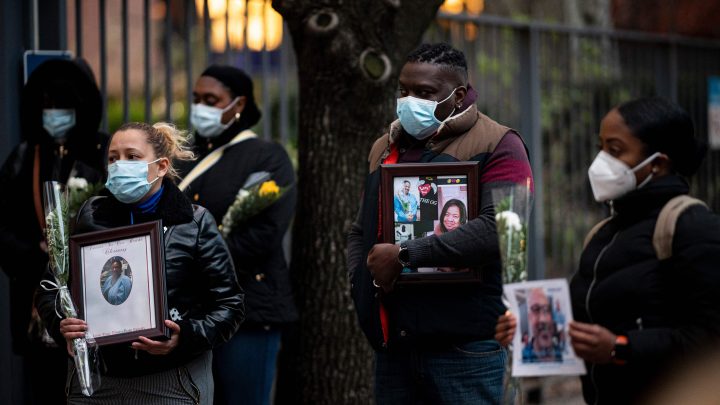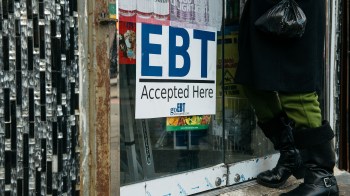
Stitching opportunity into crisis can erase pain that needs to be felt
Stitching opportunity into crisis can erase pain that needs to be felt

From a mass loss of life to economic hardship, the coronavirus pandemic and ensuing recession have caused a lot of pain. Back in July, “Marketplace’s” Kimberly Adams spoke with Megan Devine, a psychotherapist and author of “It’s OK That You’re Not OK,” about how the language of grief can be applied to conversations about economic changes and loss. Adams checked in with Devine to hear how grief is manifesting in the economy.
Kimberly Adams: So when I talked to you back in July, you suggested that we need to acknowledge the grief and the loss that we’re all experiencing before we can begin to move forward. It’s been almost six months since then. Do you think that acknowledgement has happened?
Backlash against empty platitudes
Megan Devine: I think it’s happening. I don’t think we’ve embraced it yet because it’s still really new. What I see happening is not so much that because we’ve had so much experience over the last seven and eight months that we’ve gotten better at grief, but we’ve definitely got more comfortable with saying that it hurts. With so many people grieving so many different things, I think we’re starting to see a backlash against those sort of empty platitudes. And what comes up in the wake of that is that acknowledgement like, “Yeah, this is really hard.”
Adams: I think for a lot of us, when we see these weekly unemployment numbers, or even the COVID death counts, those numbers don’t really quite hit us with as much force as they used to, say, in the spring. How can someone absorb all of that?
Devine: I think that’s a really great question, the way that you phrase that, how do we absorb all of that? We don’t. We do that to protect ourselves. It’s not good, not bad. It’s a way of psychologically distancing ourselves from something that is too big to let in. And that makes perfect sense to me, if you think the alternative is, just as you said, like, “I have to take all of this in, and absorb it, and hold on to it, and let it destroy me.” Honestly, if those are our only two options, we’re going to choose the emotional callus, the distance, right? So I think a conversation here to have is about how do we let that flow through us without sort of pooling up in our bodies and our minds? I don’t necessarily have an answer to that. But I think that’s a good question to explore.
Adams: When we spoke before, you mentioned that we have sort of this culture in America of trying to make the best of a bad situation and getting people to cheer up and feel better. And you cautioned against that in sort of trying to find a way to make what we’re going through some kind of opportunity. Looking at that word in particular, I’ve heard a lot of this in the stories we’ve been covering over the last few months, where the opportunities are how businesses are pivoting or thinking differently. What What do you make of that?
“Resilience porn”
Devine: I have a really hard time with the pairing of the words crisis and opportunity. And I’m not saying that there isn’t opportunity; there is opportunity. But when we stitch required opportunity into a crisis, and this is sort of what we’re talking about, right? Like, the second something is difficult, we’re supposed to look for the gift inside of it. And all that really does is erase the very human pain that’s at the core. This is related really to resilience porn, right? Where we really hold up these stories of people who triumph against all odds, instead of looking at the systems that create the injustices or the situations for which they need to be resilient.
Adams: This pandemic has disproportionately affected communities of color, low-income communities. We talk a lot on the show about the K-shaped recovery. And so people are feeling the weight and the impact of this pandemic in very, very different ways. How is that affecting the way we’re grieving as a community?
Devine: You can’t really do these deep, emotional things if your housing is unstable, if you are having to work three jobs just to be able to feed your kids. Like there is almost — I really hesitate to say this — but there’s almost a luxury to grieving. I hesitate to say that because grief is not a luxury, right? So it’s interesting, and I think complicated to look at, who’s allowed to grieve and who has the infrastructure and the backing behind them that they can actually feel the weight of what’s happened to them. And unfortunately, those things are coupled, right, the disproportionate effects of the pandemic, and job loss, and all of these things on communities of color. Those are also the folks who don’t have the infrastructure underneath them to be able to fall apart and to feel things the way that they deserve to.
Grief resources
Here are some resources provided by Megan Devine.
The Mighty website has several communities organized by different kinds of loss.
The Dinner Party offers support and community for grieving people, typically under 35.
Speaking Grief is home to the PBS documentary “Speaking Grief,” which can be streamed for free on the website.
Free Mom Hugs provides support for the LBGTQ community, especially those wrestling with unsupportive families.
BIPOC-specific resources:
Therapy for Black Girls promotes mental wellness for Black girls and women. There is a tool to find therapists in your area and a podcast hosted by psychologist Joy Harden Bradford.
The Safe Place is a mental health app focused on the Black community.
Latinx Therapy has a directory for therapists and speakers, as well as a podcast hosted by Adriana Alejandre, a licensed marriage and family therapist.
Being Here Human, co-founded by two women of color, focusing on grief in the BIPOC and LGBTQ communities.
Sign up here for Alica Forneret’s upcoming grief and mental health resource for BIPOC.
If you or someone you know is struggling with suicidal thoughts, anxiety or depression, call the National Suicide Prevention Lifeline at 1-800-273-8255 or text the Crisis Text Line at 741741. Here’s how to find help outside the U.S.
There’s a lot happening in the world. Through it all, Marketplace is here for you.
You rely on Marketplace to break down the world’s events and tell you how it affects you in a fact-based, approachable way. We rely on your financial support to keep making that possible.
Your donation today powers the independent journalism that you rely on. For just $5/month, you can help sustain Marketplace so we can keep reporting on the things that matter to you.


















